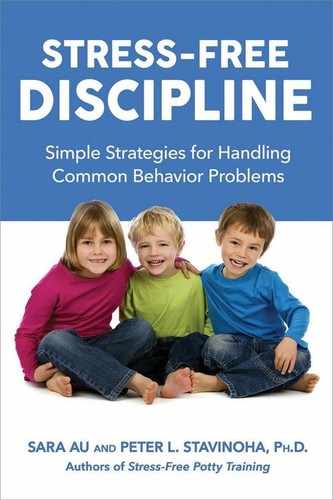12
Conclusion
Discipline is not an insurmountable challenge. From understanding how to decode your child’s behavior using the ABCs—Antecedent, Behavior, Consequence—to filling up your parenting toolbox with our 16 Universal Strategies, you should now be able to deal with problem behavior in your child and lessen some of the stress you may have felt. Specific areas of difficulty, such as tantrums, homework, mealtime, bedtime, and attitude, should be easier to handle, and you can turn what once was problematic into a positive experience for both you and your child. It’s our goal that you now feel more confident, assured of yourself, and knowledgeable about the reasons that the tips and tools in this book can work.
You can turn what once was problematic into a positive experience.
Make these strategies your own. They are aligned with the basic tenets of child development, so they’re adaptable to your individual child and your specific family circumstances. Combine your answers to the reflective questions we posed in this book with our Universal Strategies and you’ll have the best discipline plan for you. You are the expert on your own family.
Parenting is a process. There’s no absolute right or wrong way to do something, and with our Universal Strategies you can tailor your strategies to your individual child and the specific situation in which you find yourself at any given moment. The Universal Strategies give you a framework for supporting your approach to your child. Don’t feel guilty or buy into feelings of inadequacy about any of your parenting mistakes. We all make them.
Most important, throughout any parenting dilemma that comes your way, remember:

Getting this peek inside your child’s brain allows you to learn how it works. Knowing this, you can fix problems when they arise and prevent problems that might occur. The key to becoming and remaining stress-free is this knowledge. It fully informs your decision making and reactions and it allows you to be confident in your parenting skills. Confidence is crucial, so believe in yourself and in your child.
No parent, however, can fix or alleviate every problem. It’s impossible. Besides, children learn through challenges and hardship. That’s where they build resilience and character, as well as empathy for others. No child can learn to be resilient without the necessary opportunities. Allowing your child to get into situations where rejection or failure is a possible outcome is important to his or her development. Try not to be risk-avoidant for your children. Let them wander into the natural situations in which rejection or failure is a possible outcome and let them find their own way out. Allowing your child to fail is being a good parent.
Allowing your child to fail is being a good parent.
Your children will push boundaries to see how much they stretch, test patience to see how far it can be pushed, and try out different mannerisms to see what will be acceptable. It’s your job to let them know what’s acceptable and what isn’t in order to prepare them for membership in the social groups of friends, classmates, and teammates. Attitudes can push your buttons, but with this book you now have inside information on what’s behind the eye-rolls, the sassy retorts, and even the lies.
If you’re currently going through a major life transition, whether it’s a new baby, a move to a new home, a divorce, a death, or financial troubles, you now have some insight as to how that can affect your children and steps you can take to help them through it. Maintaining normalcy, to the extent possible, will give them a familiar foothold as they navigate this new territory, allowing them some semblance of security and continuity of routine. Taking care of your own personal needs for physical and emotional wellbeing is crucial, and while it may feel selfish, it’s actually the best thing you can do for your children. Here again, having confidence in yourself as a parent, and in your children’s ability to overcome problems, will help you get through this difficult time.
If you feel you need to consider going to see a professional who deals with child behavior or mental health issues, we’ve given you some guidance on making that decision. Help is available through a family counselor, a school counselor, and family intervention programs, as well as through your pediatrician or your own doctor. Referrals to mental health specialists don’t mean there’s anything wrong with your child or your family; rather, it should be looked at as an additional resource made available to you. Seeing a professional can enhance your parenting techniques and does not replace them. If you feel as if a particular problem is negatively impacting your child’s or your family’s life, that may mean you’ve crossed the line and really should call in some help. This is especially crucial if you feel your child’s safety, or that of any other member of your family, is in jeopardy due to a behavioral issue.
Gardening is an apt metaphor for parenting, since both necessitate the combination of thoughtful planning and preparation, as well as plenty of nurturing and guidance. Mother Nature also plays a role in terms of the number and magnitude of storms that pass overhead during the formative years. Ultimately, though, you’re dealing with a living organism who has a different DNA than you, and so temperament, free will, and unpredictable reactions to stimuli can come into play.
Just as plants need feeding, watering, and monitoring on a regular schedule, you need to continue to use our Universal Strategies with your kids throughout their childhood, adapting them as needed to the situations that arise. Before you know it, they’ll blossom and grow under your guidance into strong, healthy, thriving, and beautiful individuals of whom you are immensely proud. And that’s what stress-free parenting is all about.
Continue to use our Universal Strategies with your kids throughout their childhood.
• • •
